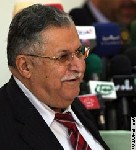 CNN
CNN - BAGHDAD, Iraq (CNN) -- Iraqi President Jalal Talabani was due to fly to Tehran to meet his Iranian counterpart on Monday as the government reopened Baghdad airport and lifted a curfew imposed after a string of deadly attacks last week.
Pressure is growing on Iraq's government and the administration of U.S. President George W. Bush to look beyond the country's borders to bring an end to the ongoing violence.
Talabani's meeting with Mahmoud Ahmadinejad, intended in part to discuss Iran's role in creating a more stable Iraq, had been planned for Saturday but was delayed because of the intense violence.
Without being specific, Talabani's office had said the president would be cleared to leave for Tehran when the curfew ended.
More than 200 people were killed in Baghdad's Sadr City neighborhood Sadr City on Thursday, the single worst attack since the war began.
Iraq restored diplomatic relations with its neighbor Syria on Tuesday during a visit to Baghdad by Syrian Foreign Minister Walid Moallem. The two countries severed relations in 1982, when Damascus sided with Tehran in its war with Iraq in the 1980s.
The United States has refused to negotiate with Iran and Syria about helping to bring stability to Iraq, accusing both Tehran and Damascus of aiding insurgent groups in Iraq. But the Bush administration has been under pressure recently to make changes in its strategy and open talks with Iran and Syria.
On Sunday, Iran's president said his country was willing to take a more active role in Iraq's future.
Ahmadinejad first lambasted the United States and its allies, in particular Britain, for being "accomplices in the crimes committed in Iraq," according to state-run news agency, IRNA. The president, an acerbic critic of U.S. policy, called on the United States and Britain to leave that war-torn country.
"You have to stop bullying, threatening and insulting nations. Today, you and your hegemony are about to collapse," he said.
Later, in the same speech, Ahmadinejad offered to help the United States "put an end to the present situation" in Iraq, on the condition that Washington stop its "bullying" in that country, and revise its approach in the Middle East.
"In that case, Iran will be ready to help you out," he said.
Iraq restored diplomatic relations with Iran in 1990, at the end of the 10-year war that killed an estimated 1 million people. Relations between Iraq and Iran have improved markedly since the fall of former Iraqi dictator Saddam Hussein and his Sunni-dominated Baath party. Shiite Muslims comprise the majority of the Iranian and Iraqi populations.
Latest violence
Gunmen opened fire on an Iraqi police patrol in southern Baghdad's Abu Dshir neighborhood Monday morning, wounding seven officers, Baghdad emergency police said.
In northern Baghdad Sunday evening, the U.S. military opened fire on a group of people believed to be members of the Mehdi militia, killing five people and wounding eight others, police said.
The incident took place around 8 p.m. in the Husseiniya district.
Also Sunday evening, four mortars landed in northern Baghdad's Adhamiya district -- a Sunni neighborhood -- wounding three people, according to police.

